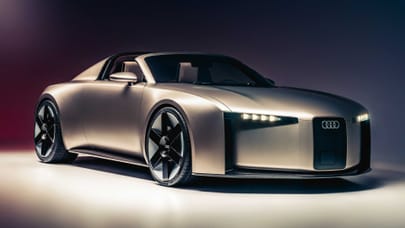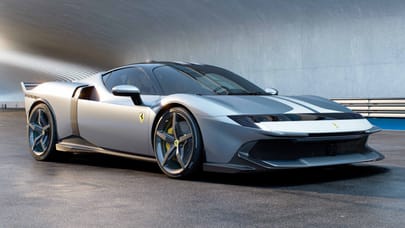
How could a 'no-deal' Brexit affect the UK car industry?
Jaguar Land Rover latest to warn about dangers to changes in trade relations, after BMW...
Jaguar Land Rover is the latest to warn that changes in the trade relationship with the EU after Brexit will jeopardise jobs here. The CEO Ralf Speth said yesterday: "If the UK automotive industry is to remain globally competitive and protect 300,000 jobs in Jaguar Land Rover and our supply chain, we must retain tariff and customs-free access to trade and talent with no change to current EU regulations."
He went on: "We urgently need greater certainty to continue to invest heavily in the UK." If there's one thing the industry dislikes more than adversity (in the form of taxes or unfavourable exchange rates, say) it's uncertainty.
JLR's warning comes within days of very much the same thing from BMW. Ian Robertson, global sales and marketing chief, said: "If we don't get clarity in the next couple of months we have to start making those contingency plans... which means making the UK less competitive than it is in a very competitive world right now." He was speaking on the eve of his retirement, so he was probably being more frank than hitherto.
'Contingency plans' of course means, as Speth says of JLR, dialling back on future investment. Currently BMW uses British factories to make hundreds of thousands of Minis and Rolls-Royces, and many more engines. But the next generations could be built elsewhere.
Nissan has also warned similar things about the future of Sunderland, though it's worth noting that the decision to build the next generation of X-Trail and Qashqai there was announced after the Brexit vote. Nissan's CEO Carlos Ghosn has a history of sabre-rattling. For years he said Sunderland would lose out if the UK didn't join the Euro, but neither happened.
Anyway, what is the car industry afraid of?
First of the worries: friction. If there are customs controls at ports, and queues of lorries result, it's chaos for the car industry. You will have heard of 'just in time' production. Suppliers of components and systems send their stuff to the factory by truck, and often the factory will hold just a few hours of stock. The truck deliveries are timed to the minute. (The reason for this is money – a car maker doesn't want to pay for thousands of seats, dashboards, gearboxes etc and then not use them for weeks.)
If new border controls are instigated, I think we can assume they will operate imperfectly, for days or months. The Mini's headlights are made in Spain, among the 60 per cent of the 3,000 components in a Mini that come from the European mainland. Imagine everything in the system is going well and all the other parts arrive safely and on time at the Oxford plant. But if the headlight lorry is held up, then immediately there will be no Minis until it arrives.
Second of the worries: tariffs. Many of the parts in many of the components of a UK-built car will have crossed the Channel several times. They begin life as castings or basic mouldings in one country and get built into ever-bigger sub-assembles elsewhere, and finally are exported as part of a complete car.
If we crash out of the EU with no trade deal and default to World Trade Organisation tariffs, that's four or five per cent on components at each Channel crossing, and ten per cent on the complete car. Jaguar Land Rover estimates this would amount to £1.2 billion a year for its operations.
Top Gear
Newsletter
Thank you for subscribing to our newsletter. Look out for your regular round-up of news, reviews and offers in your inbox.
Get all the latest news, reviews and exclusives, direct to your inbox.
Third worry: regulation. JLR's Speth, his sources tell me, is extremely exercised about this. For the sake of keeping a lid on the cost of manufacturing and engineering, UK-market cars would need to be bound by the same safety and emissions rules as EU market ones. That's already been agreed, for the foreseeable future. But it goes further. The EU would have to accept that the paints and plastics in UK-made cars meet their rules. Rules written for the safety of both the consumers and the people who work in the plants.
When we leave, that could impose a vast extra layer of certification and homologation. And it applies to global exports. At the moment the US takes British-made cars because they meet EU rules. If we're not in the single market, we will have to prove not just to the Europeans but to the Americans too that the plastics, paint and components in our cars are safe.
The car industry is also worried about movement of people. JLR has 1,000 EU nationals working in the UK, mostly in vital high-value engineering posts. There is a huge skills shortage. Go to McLaren, JLR, Ford: they all employ European engineers, even though they are trying to recruit from the UK. Many of JLR's board are EU nationals, though Speth himself, born German, now has a UK passport.
So he's not explicitly calling for us to remain in the single market. That would sound 'political' given the Prime Minister has said we are leaving it. But he is pleading for crucial outcomes which almost amount to staying in.
'Free access to the single market' is a simple slogan but a stupendously complicated thing. Winding the clock back to 1973 before Britain joined the EEC is basically impossible. One spokesman said to me: "The car industry has changed out of all recognition since then and it's almost as if the single market was designed around us."
Trending this week
- Car Review
BMW 1 Series
- Top Gear's Top 9
Nine dreadful bits of 'homeware' made by carmakers








